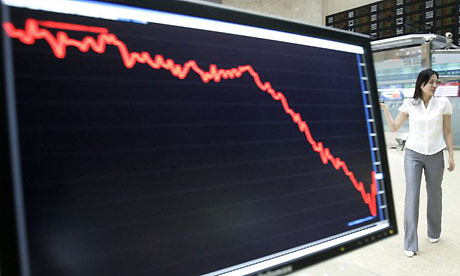As the markets crash and the world goes to hell in a handcart, environmental protesters need to get active, not just hide under the sofa
- guardian.co.uk,
- Friday October 10 2008 16.47 BST
- Article history

Stock markets fall again. Photograph: Ahn Young-Joon/AP
Today, a bunch of women are going to attempt to remind the government about climate change - a subject which appears, frankly, to have slipped its mind lately. The Climate Rush is modelled on the "rush" on parliament 100 years ago by the Suffragettes.
On Friday a group of protesters targeted the Royal Bank of Scotland for its aggressive pro-fossil fuel investment policies. And by Saturday the organisers of the London Anarchist bookfair will be hoping that "capitalism will have already collapsed in a global financial meltdown! Hooray!"
Now, if you're an environmental activist what are you thinking at the moment? Are you thinking, ooh, those poor wee strongholds of the capitalist system have had a terrible week, I'll leave them alone and give them a chance to pull themselves together? I'm sure when they've had a nice cup of Oolong tea and a sitdown they'll get round to thinking about those melting ice caps again. Or are you thinking: Wahey! Get in! Pour sugar in their petrol tanks while they're still scratching their heads in the boardrooms!
Hopefully you're going to say the latter.
Take Climate Rush. In honour of the Suffragettes, the Climate Rush - organised by a woman-only collective which includes members of Plane Stupid - is planning to gather outside the Houses of Parliament, hear some speeches, and then … get up to something. What precisely is not clear.
Now, if this is a good bit of action, it will come at the perfect time to remind MPs of their environmental responsibilities. After all, the situation hasn't just lightened briefly to give us a break while we cope with financial meltdown - and the climate bill is due to go for its third reading in the House of Commons soon.
Sure, MPs are nervous and may stampede if goaded too far. But if they're panicked enough, hopefully they'll stampede in the right direction.
And what about targeting businesses like RBS who are already under tremendous strain? Even my stony heart was moved to pity when I saw the RBS share price: it's like looking at a cardiograph at the moment of the arrest, with a long steady history and then a sudden nauseatingly vertical plunge.
Once again, however, hearts must be hardened: there was never a better moment to apply pressure.
For two and half years now environmental groups including Platform and People & PLanet have been targeting RBS's self-applied moniker The Oil and Gas Bank: RBS have been involved in financing projects such as the Baku-Tbilisi-Ceyhan pipeline (a problematic project from the start), and are now (since their ill-fated takeover of ABN/Amro last year anyway) the financiers of Gazprom's stake in the disastrous Russian Sakhalin II project.
Although they're unlikely to divest from much of this stuff at the moment, any bank is going to be terrified of losing customers, and campaigns like this can really begin to eat in to the vital student market. In the 1980s Barclays finally pulled out of South Africa after a leaked memo revealed that the long-running boycott was cutting student sign-ups, which is the key to the future customer base of any bank: climate change is certainly a subject which will appeal to students as much as apartheid.
RBS just can't afford to lose the future when everything looks so dubious in the present, so at the very least if this pressure carries on they will have to do more than make soothing noises.
And as for the anarchist book fair this weekend? (A brilliant gig by the way - you always learn something new, even if it's only how to set up your own radical feminist tantric massage collective.) It's only fair enough really. As the anarchist house mag Schnews said this week: "Blimey, you spend 15 years struggling against global capitalism and then the bloody thing collapses of its own accord".
I imagine the mood will be cheerful.



